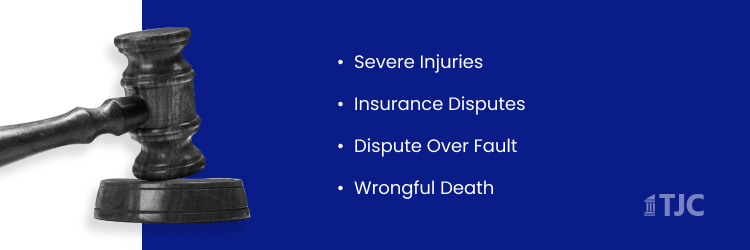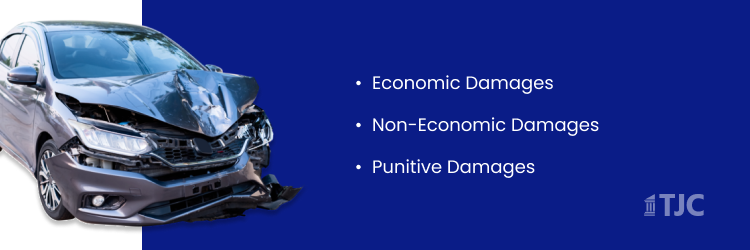Car accidents are something we hope we never have to experience, but they happen every day. A simple drive to the grocery store or commute to work can suddenly change when an accident occurs. Beyond the immediate shock and concern for safety, there’s the aftermath: damages, medical bills, insurance companies, and legal complications.
If you’re here, it’s likely because you’re trying to understand how car accident cases work, what you might be entitled to, and how long it could take to get everything resolved.
In this guide, we’re going to break down the entire process of a car accident lawsuit, from what it is and when you should consider filing one to the types of compensation you could receive.
What Is a Car Accident Lawsuit?
A car accident lawsuit is a legal claim filed by someone who has been injured in a car crash, often seeking compensation for medical bills, lost wages, pain and suffering, and property damage. This type of lawsuit falls under the umbrella of personal injury law.
Most car accident cases don’t actually end up in court. Instead, they’re settled through insurance claims. However, there are times when filing a lawsuit becomes necessary.
For example, if the insurance company denies your claim or offers an unreasonably low settlement, or if there’s a significant dispute over who was at fault, a lawsuit might be the best option to pursue fair compensation.
In a car accident claim, the goal is to make the injured party “whole” again, meaning the compensation should cover all the losses they’ve incurred as a result of the accident. This can include both economic losses, like medical expenses, and non-economic losses, like the emotional toll of being in an accident.
When Should You File a Car Accident Lawsuit?
Knowing when to file a lawsuit is critical. Most of the time, people are able to settle their claims through their insurance companies. But there are certain situations where filing a lawsuit is the best course of action. Here are a few scenarios where you might consider a lawsuit:
- Severe Injuries: If the accident resulted in severe or long-term injuries sustained, you’re likely facing extensive medical treatments and potentially ongoing therapy or rehabilitation. The compensation offered by insurance may not cover all these costs, making a lawsuit necessary.
- Insurance Disputes: If the insurance company denies your claim outright, refuses to cover your expenses, or offers an unreasonably low amount that doesn’t reflect the extent of your injuries, you might need to file a lawsuit to get the compensation you deserve.
- Dispute Over Fault: Sometimes, determining who was at fault in the accident isn’t straightforward. If there’s a dispute over who caused the crash and it’s preventing you from receiving compensation, a lawsuit can help resolve the issue.
- Wrongful Death: In tragic cases where the accident results in death, the victim’s family may need to file a wrongful death lawsuit to seek compensation for funeral expenses, loss of companionship, and other related damages.
In many cases, the decision to file a personal injury lawsuit comes down to whether the compensation being offered is fair and covers all your losses. If it doesn’t, taking legal action might be your best option.
Auto Accident Injuries: Key Factors That Affect Your Lawsuit
The nature and extent of your injuries are some of the biggest factors in determining the outcome of a car accident lawsuit. The more serious the injury, the higher the potential compensation you might receive. Let’s look at a few common injuries and how they can impact a lawsuit:
Whiplash
This is one of the most common injuries in car accidents, especially in rear-end collisions. Whiplash occurs when the head is jerked forward and then backward rapidly, causing strain on the neck.
While whiplash is often treatable with physical therapy, severe cases can lead to long-term pain and mobility issues, increasing the value of your case.
Fractures
Broken bones are also common in car accidents, particularly in the arms, legs, and ribs. The recovery time for fractures can vary, but more serious breaks may require surgery, rehabilitation, and time off work, all of which factor into the compensation you can seek.
Traumatic Brain Injuries (TBI)
Traumatic Brain Injuries are some of the most serious injuries that can occur in a car accident. They result from a blow to the head, which can cause anything from a mild concussion to severe brain damage.
Because these injuries can have lifelong consequences, including cognitive and physical impairments, they can significantly increase the value of a car accident case.
Spinal Injuries
Damage to the spine can result in partial or complete paralysis, requiring ongoing care and drastically altering the injured person’s life. These injuries often result in some of the highest settlements or court awards.
In addition to the type of injury, the overall impact on your life matters. For instance, if your injuries prevent you from working, your lost income becomes a key factor in your car accident settlement. The more severe and long-lasting your injuries, the more you can expect in compensation.
The Car Accident Lawsuit Process
If you’ve decided that filing a lawsuit is the right step, it’s helpful to understand what the process looks like. Here’s a step-by-step overview:
- Filing the Claim: Your lawyer will file a complaint in court, outlining the details of your case and the compensation you are seeking. This is the first official step in the lawsuit process.
- Discovery: In the discovery phase, both parties exchange information. This may involve police reports, witness testimonies, medical files, and any other evidence that strengthens your case. It’s a critical phase for gathering all the necessary documentation to prove your claims.
- Settlement Negotiations: In many cases, a settlement is reached before the case ever goes to trial. Your attorney will work with the other party’s insurance company to seek a fair settlement.
- Court Trial: If no settlement is reached, the case will go to court. During the jury trial, both sides present their evidence, and the jury or judge will decide the outcome. If you win the case, the court will order the defendant to pay the compensation you’re entitled to.
Understanding Car Accident Compensation
Here are the key types of compensation available:
Medical Bills
Compensation for medical costs varies based on injury severity. For minor injuries, it ranges from $2,000 to $10,000. Moderate injuries, like fractures or whiplash, may result in compensation between $10,000 and $100,000.
In severe cases, such as spinal injuries or traumatic brain injuries, medical expenses can exceed $100,000, sometimes reaching over a million dollars.
Lost Wages
If your injuries keep you from working, compensation helps recover the income you were unable to earn. For example, if you earn $50,000 annually and miss six months of work, you may claim $25,000.
If you’re permanently disabled, compensation for future wages that you’ll miss could total hundreds of thousands or even millions, depending on your occupation and age.
Pain and Suffering
This compensation accounts for the emotional and physical distress caused by the accident. For minor cases, the range is usually $5,000 to $25,000.
Moderate to severe cases, especially those involving long-term disabilities or significant pain, can see compensation from $25,000 to several million dollars.
Property Damage
Compensation for vehicle repairs or replacement typically ranges from $5,000 to $25,000, depending on the extent of the damage and the value of the vehicle.

Discover Your Potential Compensation
Get an instant estimate for car accident claims
Types of Damages in a Car Accident Lawsuit
There are three primary types of damages you might be awarded in a car accident lawsuit:
- Economic Damages: These are the calculable costs like medical bills, lost wages, and property damage. They’re easy to quantify and make up the bulk of most settlements.
- Non-Economic Damages: These include things like pain and suffering, emotional distress, and loss of enjoyment of life. While harder to quantify, non-economic damages can significantly increase the value of your case.
- Punitive Damages: In uncommon situations, the court may grant punitive damages if the other driver’s actions were especially reckless or intentional. These are meant to punish the defendant rather than compensate the plaintiff.
Factors That Affect Car Accident Compensation
Various factors can affect the compensation you may obtain in a car accident lawsuit, such as:
- Severity of Injuries: The more severe your injuries, the higher the potential compensation.
- Fault: If the other driver was clearly at fault, it strengthens your case. However, if you’re found to be partially at fault, your compensation could be reduced based on your percentage of fault.
- Insurance Policies: The amount of compensation may also be limited by the at-fault driver’s insurance policy limits. If their coverage isn’t enough to cover your damages, you may need to pursue additional compensation through your own insurance or directly from the other party.
Fault in a Car Accident Lawsuit
Determining fault is crucial in a car accident lawsuit. It directly impacts the compensation you can receive. In most states, the driver found at fault is responsible for paying damages. This includes medical bills, lost wages, and property damage. However, fault rules vary by state.
In no-fault states, each driver’s insurance covers their own damages. It doesn’t matter who caused the accident. You can only sue for severe injuries or very high costs. These laws aim to speed up compensation and reduce lawsuits.
In states with comparative negligence, fault is shared if both parties contributed to the accident. Your compensation is reduced by your percentage of fault.
For example, if you’re 20% at fault, you will receive 80% of the total damages. The less fault you have, the higher your compensation. Understanding these rules is important to determine how much you can recover.
How Long Does a Car Accident Lawsuit Take?
The length of time a car accident lawsuit takes can vary widely. Some cases are resolved within a few months, while others can drag on for years. The timeline depends on factors such as the complexity of the case, the severity of injuries, and whether the case goes to trial.
A key piece of evidence, like a police report, can sometimes help speed up the process if it clearly establishes fault. Here’s a rough idea of what to expect:
- Filing the Claim: This initial step usually takes a few weeks.
- Discovery Phase: This can take several months as both sides gather evidence.
- Settlement Negotiations: If both sides are willing to negotiate, this could shorten the process to a few months.
- Trial: If your case goes to trial, it could take a year or more to reach a resolution.
Delays can happen at any stage, especially if there’s a lot of evidence to sift through, or if negotiations stall. Having a lawyer can help speed up the process and ensure everything stays on track.
FAQs on Car Accident Lawsuit
How Long Do I Have To File A Car Accident Lawsuit?
The time limit to file a lawsuit, known as the statute of limitations, varies by state. In most states, you have between one and three years from the date of the accident to file a lawsuit. Filing within this period is essential; otherwise, you risk losing your right to seek compensation.
Do I Need A Lawyer To File A Car Accident Lawsuit?
Technically, you can file a lawsuit on your own, but it’s not recommended. Car accident lawsuits can be complicated, and without legal representation, you might miss out on critical compensation. A lawyer can handle everything from gathering evidence to negotiating with insurance companies and representing you in court.
What If The Insurance Company Denies My Claim?
If your insurance company denies your personal injury claim, you can still pursue a lawsuit. Just because your claim is denied doesn’t mean you don’t have a valid case. The denial might be based on a technicality or an undervaluation of your damages.
What Happens If I’m Partly At Fault For The Accident?
If you’re partly at fault for the accident, your compensation may be reduced. For example, in a state that follows comparative negligence, if you’re found to be 30% at fault, your compensation will be reduced by 30%.
How Does My Injury Impact My Car Accident Lawsuit?
The severity and type of injury you sustained directly affect your lawsuit. More serious injuries, like fractures or TBIs, usually result in higher settlements due to the long-term impact on your life and ability to work.
What Is Considered A Good Settlement?
A good settlement is one that fully covers your medical expenses, legal fees, lost income, pain and suffering, and property damages. It should reflect both your current and future needs. If the settlement offer doesn’t do that, it’s worth considering a lawsuit.
Conclusion
Lawsuits seeking damages related to car accidents can be tricky. Victims often file a car accident claim with their insurance carrier to get the lawsuit process started. These cases can vary significantly, from minor fender benders to devastating car crashes, often leading to intense medical care.
Whether dealing with no-fault laws, property damages, or premises liability, every car accident case is unique. The lawsuit process involves compiling essential documentation, such as medical records, the police report, and all the evidence needed to support the claimant’s injuries.
Insurance adjusters may present an offer to settle, but if it’s not commensurate with the injuries sustained, the parties involved may proceed to a jury or court trial. It’s crucial to hire adequate legal representation in this situation.




